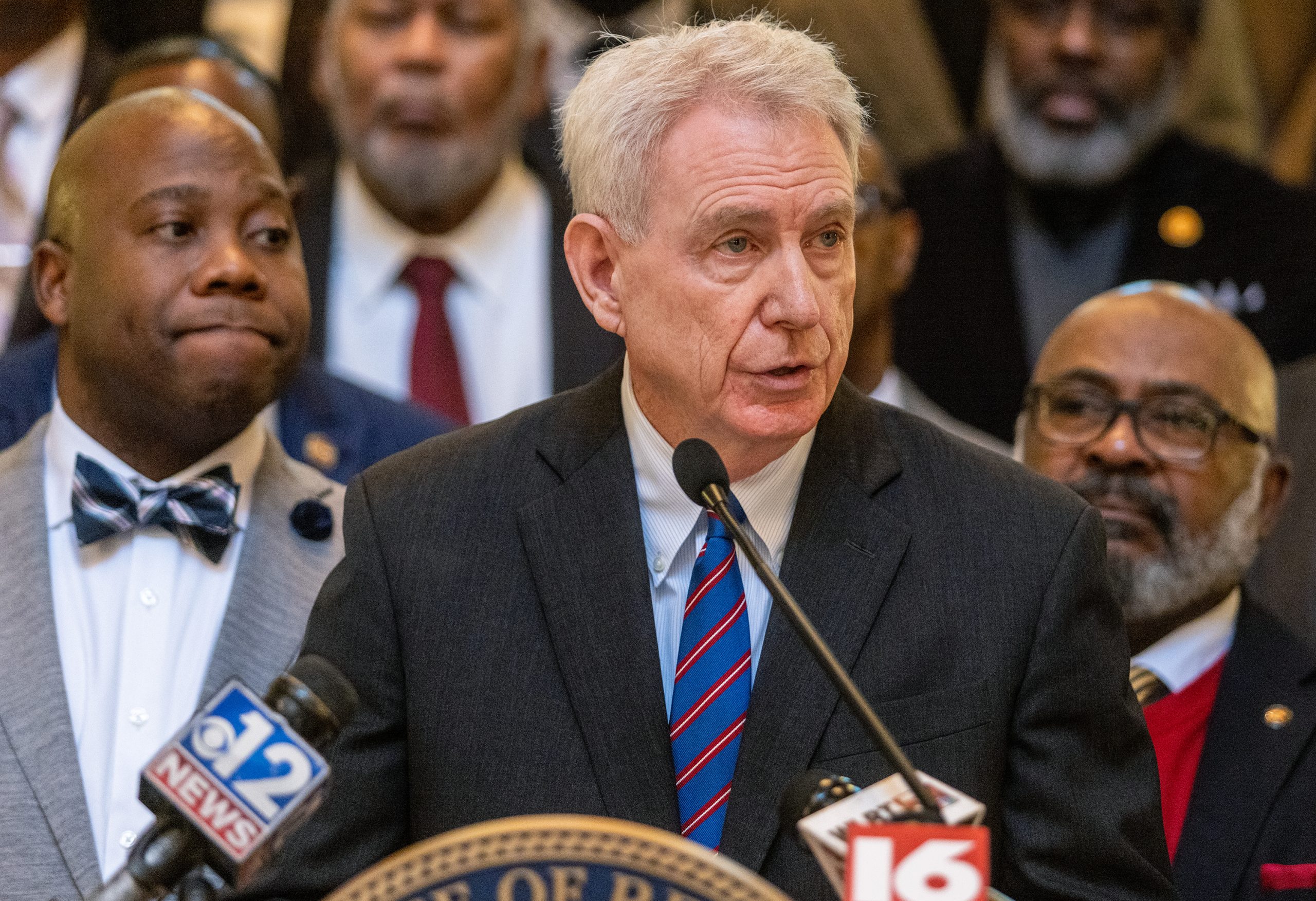Mississippi Today
Former UM chancellor: Gov. Tate Reeves privately acknowledged Medicaid expansion benefits
Former UM chancellor: Gov. Tate Reeves privately acknowledged Medicaid expansion benefits
Former University of Mississippi Chancellor Dan Jones said that Gov. Tate Reeves told him in 2015 meeting that he understood how Medicaid expansion would benefit the state but couldn’t agree to champion it for political reasons.
Jones, who led the state’s largest hospital University of Mississippi Medical Center before he served as chancellor from 2009-2015, divulged details of the 2015 meeting during a Thursday press conference with Democratic legislative leaders about the Republican leadership’s inaction on addressing the state’s hospital crisis.
“A little while after I began explaining the benefits of Medicaid expansion, he (Reeves) put his hand up and said, ‘Chancellor, I recognize it would be good for Mississippians, good for our economy, good for health care if we expanded Medicaid,'” Jones recalled. “I had a big smile on my face and said, ‘I’m so glad to hear you’re going to support expansion.’ His response, ‘Oh no, I’m not going to support it because it’s not in my personal political interest.'”
The revelation about Reeves’ closed-door expression to Jones directly counters the governor’s long-held public stances. Reeves, who previously spent eight years as lieutenant governor and leader of the state Senate, has defiantly opposed Medicaid expansion for more than a decade.
Even earlier this week, the governor tripled down on his opposition to expansion in a speech.
“Don’t simply cave under the pressure of Democrats and their allies in the media who are pushing for the expansion of Obamacare, welfare, and socialized medicine,” Reeves said during his annual State of the State address on Monday. “You have my word that if you stand up to the left’s push for endless government-run healthcare, I will stand with you.”
Reeves’ office did not immediately respond Thursday to a request for comment on Jones’ charge.
Lawmakers, working in Jackson until early April, face growing pressure to address the state’s worsening hospital crisis. State Health Officer Dr. Daniel Edney warned them in December that 38 hospitals across the state are in danger of closing in the short-term because of budget concerns. Meanwhile, Mississippi has the highest percentage of uninsured residents who cannot afford health care, so hospitals often have to cover those care costs themselves.
One hospital funding solution that 39 other states — including many Republican-led states — have implemented is Medicaid expansion under the Affordable Care Act. Economists estimate Mississippi would receive more than $1 billion per year in new revenue, and hospitals would benefit directly.
Meanwhile, public sentiment for Medicaid expansion is growing. A Mississippi Today/Siena College poll conducted in early January 2023 found that 80% of Mississippians, including 70% of Republicans, support expansion.
READ MORE:Poll: 80% of Mississippians favor Medicaid expansion
Despite the growing popularity of the measure, Republicans who run state government have not budged. More than 15 different bills that would have expanded Medicaid — all filed by Democrats in early 2023 — died in committee earlier this week without receiving a vote or even a debate by Republican committee chairs.
Speaker of the House Philip Gunn has been in lockstep with Reeves in his opposition of expansion, and Lt. Gov. Delbert Hosemann, who has said in the past he is open to some version of expansion, has not made the issue a priority this session.
“The governor and the party he leads have deflected, distracted, and attempted to discredit the merits of programs that have made real, positive impacts on health outcomes in other states that have adopted them — some, even, just as red as Mississippi,” Rep. Robert Johnson, the Democratic House leader, said at the press conference on Thursday. “They’ve downplayed the severity of the crisis, not only diminishing just how dangerous the lack of access to care is becoming across our state, but ignoring the economic damage closing hospitals will cause in communities.”
In 2010, Congress adopted President Barack Obama’s Affordable Care Act, the Medicaid program that allowed states to opt into to draw down large amounts of federal funding to provide health coverage for mostly poor, working people.
One year later, then-state Treasurer Tate Reeves ran for his first term as lieutenant governor, and in 2015 ran for a second term. That is when, Jones said, the meeting with Reeves occurred at the chancellor’s office in the Lyceum administrative building.
In that 2015 meeting, Jones said he pointed out to Reeves that he had the opportunity as the state’s Senate leader to champion Medicaid expansion to help hospitals and help poor, working people afford health coverage.
Jones, during the press conference on Thursday, shared three imperatives to expand Medicaid: a moral one, an economic one, and a political one.
“Shame on us, shame on us, for allowing the citizens of Mississippi to have health care problems and not have access to health care solutions … it is immoral,” Jones said. “… It’s time for us to put the pressure on leaders of our state to move past the personal political interests and consider the interests of every Mississippian who needs access to health care.”
READ MORE:Mississippi leaving more than $1 billion per year on table by rejecting Medicaid expansion
This article first appeared on Mississippi Today and is republished here under a Creative Commons license.
Did you miss our previous article…
https://www.biloxinewsevents.com/?p=207145
Mississippi Today
Trump nominates Baxter Kruger, Scott Leary for Mississippi U.S. attorney posts
President Donald Trump on Tuesday nominated Baxter Kruger to become Mississippi’s new U.S. attorney in the Southern District and Scott Leary to become U.S. attorney for the Northern District.
The two nominations will head to the U.S. Senate for consideration. If confirmed, the two will oversee federal criminal prosecutions and investigations in the state.
Kruger graduated from the Mississippi College School of Law in 2015 and was previously an assistant U.S. attorney for the Southern District. He is currently the director of the Mississippi Office of Homeland Security.
Sean Tindell, the Mississippi Department of Public Safety commissioner, oversees the state’s Homeland Security Office. He congratulated Kruger on social media and praised his leadership at the agency.
“Thank you for your outstanding leadership at the Mississippi Office of Homeland Security and for your dedicated service to our state,” Tindell wrote. “Your hard work and commitment have not gone unnoticed and this nomination is a testament to that!”
Leary graduated from the University of Mississippi School of Law, and he has been a federal prosecutor for most of his career.
He worked for the U.S. Attorney’s Office in the Western District of Tennessee in Memphis from 2002 to 2008. Afterward, he worked at the U.S. Attorney’s Office for the Northern District of Mississippi in Oxford, where he is currently employed.
Leary told Mississippi Today that he is honored to be nominated for the position, and he looks forward to the Senate confirmation process.
This article first appeared on Mississippi Today and is republished here under a Creative Commons Attribution-NoDerivatives 4.0 International License.
The post Trump nominates Baxter Kruger, Scott Leary for Mississippi U.S. attorney posts appeared first on mississippitoday.org
Note: The following A.I. based commentary is not part of the original article, reproduced above, but is offered in the hopes that it will promote greater media literacy and critical thinking, by making any potential bias more visible to the reader –Staff Editor.
Political Bias Rating: Centrist
This article presents a straightforward news report on President Donald Trump’s nominations of Baxter Kruger and Scott Leary for U.S. attorney positions in Mississippi. It focuses on factual details about their backgrounds, qualifications, and official responses without employing loaded language or framing that favors a particular ideological perspective. The tone is neutral, with quotes and descriptions that serve to inform rather than persuade. While it reports on a political appointment by a Republican president, the coverage remains balanced and refrains from editorializing, thus adhering to neutral, factual reporting.
Mississippi Today
Jackson’s performing arts venue Thalia Mara Hall is now open
After more than 10 months closed due to mold, asbestos and issues with the air conditioning system, Thalia Mara Hall has officially reopened.
Outgoing Mayor Chokwe A. Lumumba announced the reopening of Thalia Mara Hall during his final press conference held Monday on the arts venue’s steps.
“Today marks what we view as a full circle moment, rejoicing in the iconic space where community has come together for decades in the city of Jackson,” Lumumba said. “Thalia Mara has always been more than a venue. It has been a gathering place for people in the city of Jackson. From its first class ballet performances to gospel concerts, Thalia Mara Hall has been the backdrop for our city’s rich cultural history.”
Thalia Mara Hall closed last August after mold was found in parts of the building. The issues compounded from there, with malfunctioning HVAC systems and asbestos remediation. On June 6, the Mississippi State Fire Marshal’s Office announced that Thalia Mara Hall had finally passed inspection.
“We’re not only excited to have overcome many of the challenges that led to it being shuttered for a period of time,” Lumumba said. “We are hopeful for the future of this auditorium, that it may be able to provide a more up-to-date experience for residents, inviting shows that people are able to see across the world, bringing them here to Jackson. So this is an investment in the future.”
In total, Emad Al-Turk, a city contracted engineer and owner of Al-Turk Planning, estimates that $5 million in city and state funds went into bringing Thalia Mara Hall up to code.
The venue still has work to be completed, including reinstalling the fire curtain. The beam in which the fire curtain will be anchored has asbestos in it, so it will have to be remediated. In addition, a second air-conditioning chiller needs to be installed to properly cool the building. Until it’s installed, which could take months, Thalia Mara Hall will be operating at a lower seating capacity of about 800.
“Primarily because of the heat,” Al-Turk said. “The air conditioning would not be sufficient to actually accommodate the 2,000 people at full capacity, but starting in the fall, that should not be a problem.”
Al-Turk said the calendar is open for the city to begin booking events, though none have been scheduled for July.
“We’re very proud,” he said. “This took a little bit longer than what we anticipated, but we had probably seven or eight different contractors we had to coordinate with and all of them did a superb job to get us where we are today.”
This article first appeared on Mississippi Today and is republished here under a Creative Commons Attribution-NoDerivatives 4.0 International License.
The post Jackson’s performing arts venue Thalia Mara Hall is now open appeared first on mississippitoday.org
Note: The following A.I. based commentary is not part of the original article, reproduced above, but is offered in the hopes that it will promote greater media literacy and critical thinking, by making any potential bias more visible to the reader –Staff Editor.
Political Bias Rating: Centrist
The article presents a straightforward report on the reopening of Thalia Mara Hall in Jackson, focusing on facts and statements from city officials without promoting any ideological viewpoint. The tone is neutral and positive, emphasizing the community and cultural significance of the venue while detailing the challenges overcome during renovations. The coverage centers on public investment and future prospects, without partisan framing or editorializing. While quotes from Mayor Lumumba and a city engineer highlight optimism and civic pride, the article maintains balanced, factual reporting rather than advancing a political agenda.
Mississippi Today
‘Hurdles waiting in the shadows’: Lumumba reflects on challenges and triumphs on final day as Jackson mayor
On his last day as mayor of Jackson, Chokwe Antar Lumumba recounted accomplishments, praised his executive team and said he has no plans to seek office again.
He spoke during a press conference outside of the city’s Thalia Mara Hall, which was recently cleared for reopening after nearly a year of remediation. The briefing, meant to give media members a peek inside the downtown theater, marked one of Lumumba’s final forays as mayor.
Longtime state Sen. John Horhn — who defeated Lumumba in the Democratic primary runoff — will be inaugurated as mayor Tuesday, but Lumumba won’t be present. Not for any contentious reason, the 42-year-old mayor noted, but because he returns to his private law practice Tuesday.
“I’ve got to work now, y’all,” Lumumba said. “I’ve got a job.”
Thalia Mara Hall’s presumptive comeback was a fitting end for Lumumba, who pledged to make Jackson the most radical city in America but instead spent much of his eight years in office parrying one emergency after another. The auditorium was built in 1968 and closed nearly 11 months ago after workers found mold caused by a faulty HVAC system – on top of broken elevators, fire safety concerns and vandalism.
“This job is a fast-pitched sport,” Lumumba said. “There’s an abundance of challenges that have to be addressed, and it seems like the moment that you’ve gotten over one hurdle, there’s another one that is waiting in the shadows.”
Outside the theater Monday, Lumumba reflected on the high points of his leadership instead of the many crises — some seemingly self-inflicted — he faced as mayor.
He presided over the city during the coronavirus pandemic and the rise in crime it brought, but also the one-two punch of the 2021 and 2022 water crises, exacerbated by the city’s mismanagement of its water plants, and the 18-day pause in trash pickup spurred by Lumumba’s contentious negotiations with the city council in 2023.
Then in 2024, Lumumba was indicted alongside other city and county officials in a sweeping federal corruption probe targeting the proposed development of a hotel across from the city’s convention center, a project that has remained stalled in a 20-year saga of failed bids and political consternation.
Slated for trial next year, Lumumba has repeatedly maintained his innocence.
The city’s youngest mayor also brought some victories to Jackson, particularly in his first year in office. In 2017, he ended a furlough of city employees and worked with then-Gov. Phil Bryant to avoid a state takeover of Jackson Public Schools. In 2019, the city successfully sued German engineering firm Siemens and its local contractors for $89 million over botched work installing the city’s water-sewer billing infrastructure.
“I think that that was a pivotal moment to say that this city is going to hold people responsible for the work that they do,” Lumumba said.
Lumumba had more time than any other mayor to usher in the 1% sales tax, which residents approved in 2014 to fund infrastructure improvements.
“We paved 144 streets,” he said. “There are residents that still are waiting on their roads to be repaved. And you don’t really feel it until it’s your street that gets repaved, but that is a significant undertaking.”
And under his administration, crime has fallen dramatically recently, with homicides cut by a third and shootings cut in half in the last year.
Lumumba was first elected in 2017 after defeating Tony Yarber, a business-friendly mayor who faced his own scandals as mayor. A criminal justice attorney, Lumumba said he never planned to seek office until the stunning death of his father, Chokwe Lumumba Sr., eight months into his first term as mayor in 2014.
“I can say without reservation, and unequivocally, we remember where we started. We are in a much better position than we started,” Lumumba said.
Lumumba said he has sat down with Horhn in recent months, answered questions “as extensively as I could,” and promised to remain reachable to the new mayor.
This article first appeared on Mississippi Today and is republished here under a Creative Commons Attribution-NoDerivatives 4.0 International License.
The post 'Hurdles waiting in the shadows': Lumumba reflects on challenges and triumphs on final day as Jackson mayor appeared first on mississippitoday.org
Note: The following A.I. based commentary is not part of the original article, reproduced above, but is offered in the hopes that it will promote greater media literacy and critical thinking, by making any potential bias more visible to the reader –Staff Editor.
Political Bias Rating: Center-Left
The article reports on outgoing Jackson Mayor Chokwe Antar Lumumba’s reflections without overt editorializing but subtly frames his tenure within progressive contexts, emphasizing his self-described goal to make Jackson “the most radical city in America.” The piece highlights his accomplishments alongside challenges, including public crises and a federal indictment, maintaining a factual tone yet noting contentious moments like labor disputes and governance issues. While it avoids partisan rhetoric, the focus on social justice efforts, infrastructure investment, and crime reduction, as well as positive framing of Lumumba’s achievements, aligns with a center-left perspective that values progressive governance and accountability.
-
Mississippi Today6 days ago
Defendant in auditor’s ‘second largest’ embezzlement case in history goes free
-
News from the South - Georgia News Feed5 days ago
Are you addicted to ‘fridge cigarettes’? Here’s what the Gen Z term means
-
News from the South - Florida News Feed7 days ago
Marcos Lopez arrest: Owner of club named in RICO document
-
The Conversation6 days ago
Toxic algae blooms are lasting longer than before in Lake Erie − why that’s a worry for people and pets
-
News from the South - Texas News Feed7 days ago
Country singer’s teeth fall out on stage
-
News from the South - Tennessee News Feed6 days ago
5 teen boys caught on video using two stolen cars during crash-and-grab at Memphis gas station
-
Local News6 days ago
St. Martin trio becomes the first females in Mississippi to sign Flag Football Scholarships
-
Local News6 days ago
Mississippi Power shares resources and tips for lowering energy bill in the summer


















































